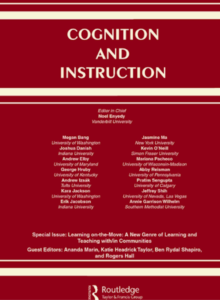Ananda Marin, FLDC member, is the author of “Ambulatory Sequences: Ecologies of Learning by Attending and Observing on the Move” which was published in the Cognition and Instruction journal.
Abstract: There is a growing corpus of research in the educational sciences that explores the multiple ways in which mobility, or people’s movement from place to place and through places, both constitutes and influences learning. Ambulatory methods and walking interviews are increasingly being used by social scientists and performance researchers to understand human knowledge building from place-based perspectives. In this paper, I consider how educational researchers can create accounts of learning that foreground the relational, interdependent, and land-based aspects of learning and development. I introduce ambulatory turns and sequences as a unit of analysis and method for studying learning-on-the-move.
Access the full article here.




